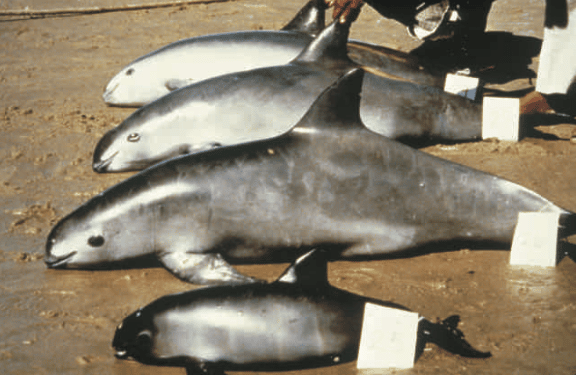Today, on Endangered Species Day, we bid farewell to yet another beautiful species decimated by human activity: the vaquita. With less than a handful of these small porpoises left in the world, experts have concluded there is no option but to pursue a risky, last-ditch attempt at preserving vaquitas by removing them from the wild and placing them in captivity. The question is: was the extinction of the vaquita preventable?
International Demand for Endangered Species Products
Vaquitas have been listed as critically endangered for over twenty-five years, and the illegal fishing of the endangered totoaba fish is the sole cause of the decline of the vaquita population. Illegal fishing is a lucrative business with the high demand for totoaba bladders as a status symbol and medicinal supplement in Asia resulting in the bladders being nicknamed “aquatic cocaine.” Vaquitas, however, are killed purely as bycatch from the gillnets used to catch totoabas illegally.
Lack of Mexican Law Enforcement
A 2014 report from the Comité Internacional para la Recuperación de la vaquita (CIRVA) revealed that “fishermen who wish to comply with regulations feel they are being undercut when illegal fishermen operate without constraints or punishment.” Furthermore, the fishermen revealed that the vaquita and totoaba were not the only victims of illegal fishing operations– their own livelihoods were threatened by traffickers’ activities.
These fishermen were in the classic position of a whistleblower: trying to follow the law while surrounded by people engaged in illegal activity. Many Mexican fishermen were willing report the illegal activities they observed to CIRVA, but witnessing the impunity of the illegal fisherman discouraged them from reporting it to their own law enforcement agencies. With local Mexican law enforcement condoning the illegal totoaba trade (either through corruption or negligence), the fishermen likely felt that they did not have a trustworthy outlet to share their information about the traffickers.
Lack of U.S. Law Enforcement
Southern California is a hub for totoaba trafficking activities. Consequently, U.S. enforcement authorities had jurisdiction over many traffickers connected to the illegal trade in totoaba bladders. U.S. enforcement authorities also had expertise in detecting and sanctioning criminals who engage in illicit activities outside the United States, and a variety of tools at their disposal that could have enabled them to incentivize local sources to detect and report the illegal fishing and smuggling.
The power of working with local sources in crime detection and law enforcement has been demonstrated by numerous successful prosecutions under the Foreign Corrupt Practices Act and the Act to Prevent Pollution from Ships (APPS).

In 2014, CIRVA recommended that “all available enforcement tools, both within and outside Mexico, be applied to stopping illegal fishing, especially the capture of totoabas and the trade in their products”.
Local communities were not informed about the opportunity to receive a reward for providing information about totoaba traffickers, nor was there a safe and effective way to report illegal activity. To help ensure that a lack of enforcement does not drive additional extinctions, the U.S. Fish and Wildlife Service and the National Marine Fisheries Service, should have a confidential and anonymous process for whistleblowers to use, modeling the well-established and highly successful whistleblower programs, available under all other U.S. whistleblower reward laws, that are frequently utilized by non-U.S. citizens.
Minimal Consequences for Apprehended Traffickers
Illegal fishing is part of the multi-million-dollar transnational wildlife trafficking industry. The trade has transitioned from a crime of opportunity undertaken by local community members, to a sophisticated operation run by organized criminal networks. The lenient consequences that traffickers have faced for driving the vaquita to extinction, have contributed to the low risk, high reward nature of illegal fishing.
While the maximum penalties listed for typical charges related to totoaba trafficking, such as smuggling, unlawful importation of wildlife, and conspiracy yield sentencing from 5- 20 years, and/ or fines of $250,000, in practice final judgements reflect a very different reality. For example, the international market value of the totoaba bladders seized from six smugglers alone was between $5.16 million and $10.32 million. All but one were sentenced to probation or “time served” awaiting trial, and the defendant described as a “lead player in this trafficking, who coordinated cross-border smuggling”, received a sentence of merely four months.
A Framework to Build On
If there is any hope of preventing the further loss of our planet’s species, the U.S. government must commit to stronger enforcement against traffickers. The responsible U.S. government agencies can start moving things in the right direction by ensuring they fully utilize all of the legal tools they have to protect our wildlife, including working effectively with whistleblowers.
Further Reading:
- Environmental Investigation Agency (EIA) Report
- Comité Internacional para la Recuperación de la vaquita: CIRVA-9 Report (May 2017)
- NWC Global Wildlife Whistleblower Program
[Main image by Alejandro Robles via NOAA]


